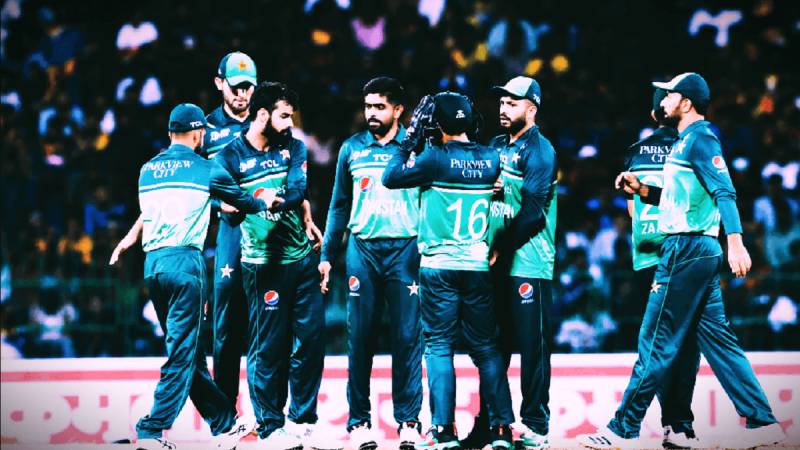
The Pakistan team has finally arrived in India. Beyond the memes of a group led by a man called 'Babar' stepping onto the Subcontinent with a view to conquering it, speculation abounds for the 241 million fans at home regarding the performance of the 'Men in Green' over the next 45 days!
For those who value their nails more than the outcome of sporting events, Pakistan enjoys an above-average return at tournaments billed as World Cups. It has reached the semi-finals of World Cups for the 50-overs format four times, going on to play in two finals, winning one of them in 1992.
At this moment, the pressing question arises: should we dwell on past glories or swiftly set our sights on winning more laurels and trophies?
While our track record of getting to the penultimate stage of the tournament is fairly good, the last time we managed to reach that stage was over a decade ago, in 2011. The venue was Mohali, and our opponents on the day were India. Pakistan dominated the match until something inexplicable occurred. It was as if the witches of Macbeth had cast a spell over the Dunsinane woods, and we began to lose our grip on the game.
Team confidence evaporated as panic bubbled to the surface in the blink of an eye.
I am not usually one to pay heed to conspiracy theories in cricket, but during that game, I couldn't help but smell a rat. Whether it was divine intervention favouring India or mere human frailty, one can never truly know, but in my mind, that event sullied our beloved sport.
In the absence of Naseem Shah, I would have chosen someone like Shahnawaz Dahani. But the selectors opted for Hasan Ali
Now, let's focus on the present — the World Cup in India.
To win any tournament, your squad selection needs to be impeccable. Here, I believe Pakistan could have been bolder.
Under Babar's leadership, we opted for a safety vale-esque approach, overlooking the current form of players and perhaps opting for selections motivated by personal preferences.
One notable omission is that of Imad Wasim in favour of an out-of-form Nawaz. Could this decision come back to haunt us?
Imad is currently setting the universe of the white ball alight with wickets and runs galore, but our team management and selectors fail to see that and keep shutting the door on him. To me, that is neither wise nor fair!
In the absence of Naseem Shah, I would have chosen someone like Shahnawaz Dahani. But the selectors opted for Hasan Ali, an experienced option but with a less-than-impressive recent record in 50 overs cricket. His last major exploits came in the Champions Trophy six years ago. In recent times, he has been less than impressive whenever he's adorned the Pakistani colours. 'The generator', as he is affectionately known, is a bit of a lottery, and in lotteries, you can't always control your destiny.
If Pakistan aims to be a genuine contender in this tournament, such a timid approach must be replaced with courage, aggression, and, above all, intent
Cricket is now driven by data, a facet Pakistan tends to inexplicably neglect in 2023. By ignoring players topping the charts, we have often suffered poor results. It epitomises our failure to embrace cricket as a science. In my opinion, cricket is a science with a little bit of instinct, but for the latter, you need a keen eye to spot talent on a whim. Nowadays, we lack that eerie quality of spotting players and churning out stars at will!
I also believe that under Babar's captaincy, Pakistan has lacked intent and innovation. For instance, in the warm-up game against New Zealand, we managed only 33 runs in the powerplay—an outcome that can only be described as criminal.
It makes one wonder if Babar Azam has been transported back to 1975, the year of the inaugural World Cup in England, via some sort of time machine. It is the only plausible explanation for scoring 33 runs during a powerplay.
It's a severe lack of intent.
If the time machine did not transport our top three batters back to the '70s, teams on flat wickets such as these manage 60-70 runs during the power play with consummate ease. New Zealand showcased that, scoring 65 runs without breaking a sweat. Even though this was a warm-up match of no consequence, it painfully identified an area where we have the potential to lose games.
If Pakistan aims to be a genuine contender in this tournament, such a timid approach must be replaced with courage, aggression, and, above all, intent -- as cliched as it might sound, it still is the truth.
Another potential stumbling block for Pakistan is the absence of a genuine off-spinner. The spinners included in the squad can, at best, be described as "Relukatas," versatile but not masterful.
When playing in India, having a specialist spinner is imperative, and I hope that Usama Mir, a legitimate leg-spinner, can rise to the occasion. However, it would have been ideal to have another top-quality spinner partner with him.
Lastly, if Pakistan intends to secure a spot in the semi-finals, Captain Babar Azam must lead by example — scoring at a faster clip himself and prioritising the needs of the team in tandem is part of his job.
Let's hope that, in the days to come, a touch of magic can dispel chronic issues such as poor strategy, lack of intent, passivity, and an aversion to the "horses for courses" philosophy. This squad is filled with talent; it needs nothing more than a sensible, selfless shepherd.

